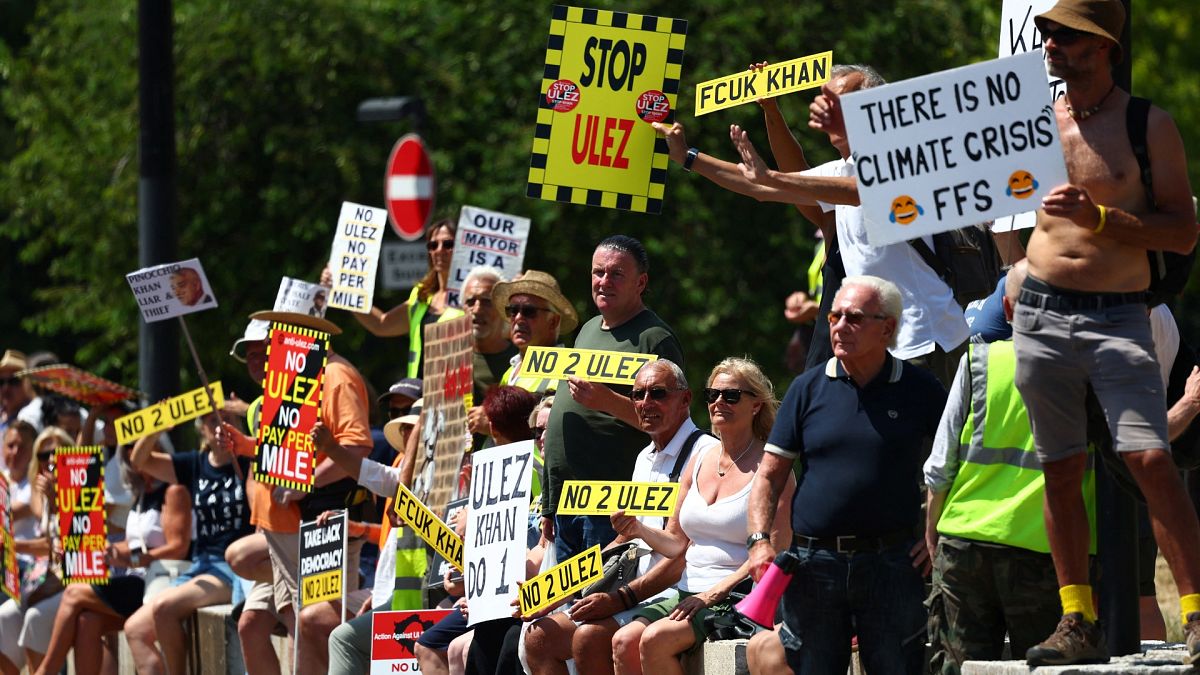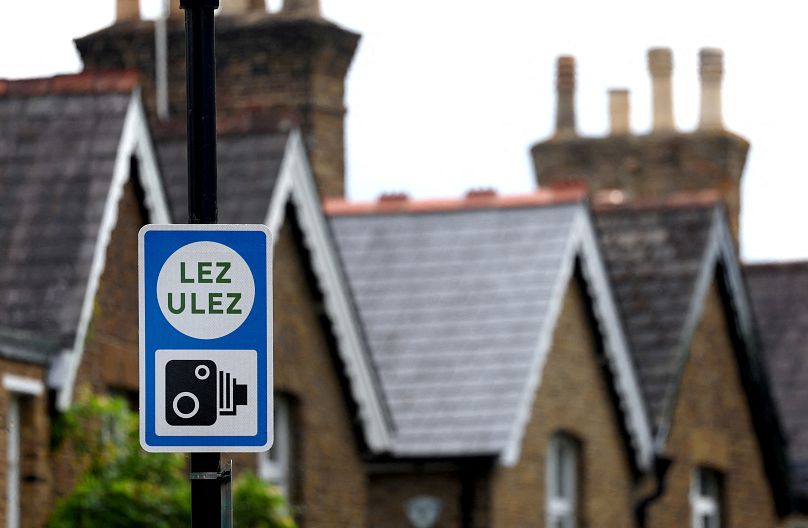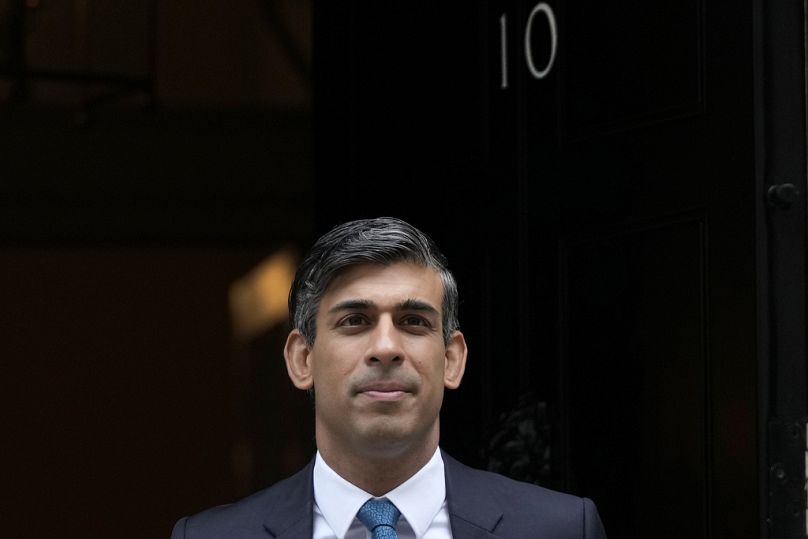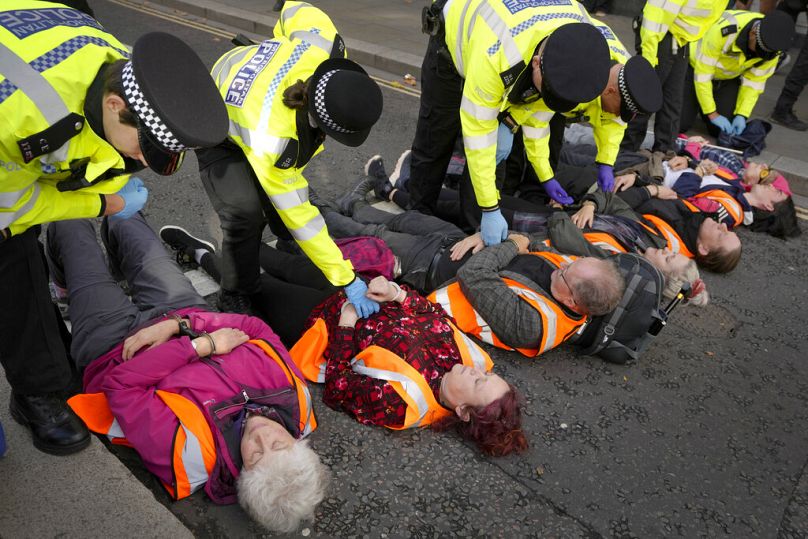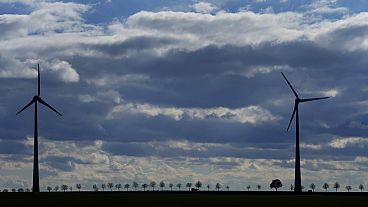As the UK looks at rolling back green commitments, there are concerns that climate issues are feeding into cultural confrontation and identity politics.
Climate change has once again become a hot topic in the UK but for all the wrong reasons.
At the end of July, the government approved hundreds of new oil and gas licences, a “rethink” of pollution-cutting policies has been proposed and MPs are pushing to ditch green commitments.
A by-election in former Prime Minister Boris Johnson’s constituency appears to have triggered the shift after the Conservative party candidate dubbed his race a “referendum on ULEZ” (the ultra-low emissions zone). The focus on opposing London’s pollution reduction scheme narrowly won him the race.
Now, as even opposition politicians start to reassess their position on climate action, there are worries that a climate ‘culture war’ has arrived in the UK.
What is the ‘climate culture war’?
The phrase ‘climate culture war’ has started to creep into news headlines and politicians’ tweets in recent weeks. It is being used in an attempt to call out this shift in the way climate action is being portrayed.
Jennie King, an expert in the evolving trends of climate mis and disinformation, says that many aren’t entirely sure what they mean when they use the term.
“You now have a space where the traditional climate deniers or delayers are merging with a much broader and largely decentralised universe of extremists and conspiracy movements,” the head of Climate Research and Policy at the Institute for Strategic Dialogue (ISD) explains.
This leaves the space open to “professional disinformation actors and outrage merchants”.
It is also merging with the right-wing media ecosystem, she adds, in a way that isn’t even necessarily about the substance of climate change policy, but more about how the climate is symbolic of larger unifying themes.
“Denier’s arguments have existed for a very long time, but climate issues are, in much more prominent ways, feeding into cultural confrontation and identity politics.”
Issues like the cost of living crisis, Russia’s invasion of Ukraine and personal freedom are being dragged into the debate. The playbook of arguments is one that has been seen before.
Much like during COVID-19, King says climate change has become a “new crucible” where previously distinct movements and actors have found a common cause. The trauma of huge global events like the pandemic can’t be discounted.
These seismic shocks to our social and economic systems rock people’s sense of security about the future and their ability to look after themselves or their families.
“There are very genuine concerns and grievances that lie at the heart of that trauma,” King says.
“But those traumas are very easily weaponised, exploited and pivoted towards opposition on a whole host of different issues.”
Exploiting the gap between public opinion and climate action
A number of public policy issues have become victims of this dynamic.
Localised issues, just like the ULEZ in the Uxbridge and South Ruislip by-election, are more vulnerable to “very emotive, partially conspiratorial attacks”, King says. They have become a lightning rod for people who want to talk about “green tyranny” and civil liberties.
Many of these criticisms play on people’s genuine concerns about current societal issues. Narratives have emerged around climate policies costing too much or being too difficult to implement.
A group of Conservative politicians recently urged the Prime Minister to rethink the government’s climate commitments with MP Sir Jacob Rees-Mogg claiming they are “unpopular” and “expensive”.
Even Prime Minister Rishi Sunak has now hinted at watering down policies, saying measures must be “proportional and pragmatic” without adding “hassle” or cost to households. The Prime Minister defended his approval of new oil and gas licences by reasoning that energy security was important following Russia’s invasion of Ukraine.
British public increasingly concerned about climate change
A majority of the UK public is still concerned about the effects of climate change. A recent poll from Ipsos found that one in four Britons see it as an important issue for the country - the highest level since COP26 in Glasgow in 2021.
Researchers say recent reports of wildfires and extreme temperatures disrupting people’s holidays are likely the cause.
Where and who you ask also matters. Transport for London found in May this year that a small majority of Londoners are in favour of the ULEZ whereas UK-wide polling showed the opposite.
Support was split down political lines with Labour, Liberal Democrat and Green party voters far more likely to back clean air zones.
“What's really coming to the fore in conversation at the moment is how easy it is to exploit the gap between general public approval and recognition for the necessity of climate action versus actually being able to propose and implement an ambitious policy platform,” King adds.
Labelling climate groups as ‘extremists’ could have serious consequences
As the UK approaches its next general election, the climate crisis looks set to become the next weaponised topic.
What is particularly concerning to organisations like the ISD is how the conversation around climate action has been co-opted by those who want to split it into ‘pro-freedom’ and ‘anti-freedom’ groups.
“I also suspect that the rhetoric around so-called eco-extremism is going to become more and more febrile,” King says. She believes that this shift in language could rapidly become dangerous.
When the ISD uses terms like ‘eco-extremism’, it means something substantive and specific. A neo-Nazi movement that justifies its supremacist worldview through the environmental lens, for example.
“What is not eco-extremism, at least from a definitional point of view, is movements that use forms of civil disobedience to advocate for climate action on the streets of the UK,” she explains.
A key element of the disinformation playbook is to ‘other’ certain groups in society - setting them apart by attributing negative characteristics. Though it may seem trivial, using this kind of language against environmental movements helps to drive a wedge between members of society.
Discussions about whether throwing paint at a building or glueing yourself to the road is the right thing to do are fine, King says, but there are serious implications to labelling these groups as ‘extremists’.
Drawing links between societal problems and people who are protesting can escalate to the point of violence. Tensions rise and dangerous arguments emerge, such as justifying running protesters over with cars.
We’ve already seen this happen when a truck driver pushed, dragged and almost ran down a Last Generation protester in Germany in July. Videos of the incident posted online gathered hundreds of comments and posts praising the driver for his actions.
King points out that it’s always worth highlighting when the people who are using this inflammatory terminology have affiliations that may discredit their positions.
“That isn't going to be the case in every example, but where there is an MP that is using that language who also happens to, I don't know, sit on the board of one of these think tanks that receive funding for fossil fuel and of the industries,” she says, “I don't think it ever loses its value to point out those associations.”
Ultimately what is lost in this polarisation is the ability to have sober and candid conversations about the net zero transition. Essential debates between citizens and elected officials get pulled into this highly divisive space and everyone loses out.
“[It] has nothing to do with the substance of policy and is all to do with who should or should not be involved in the conversation,” King explains.
